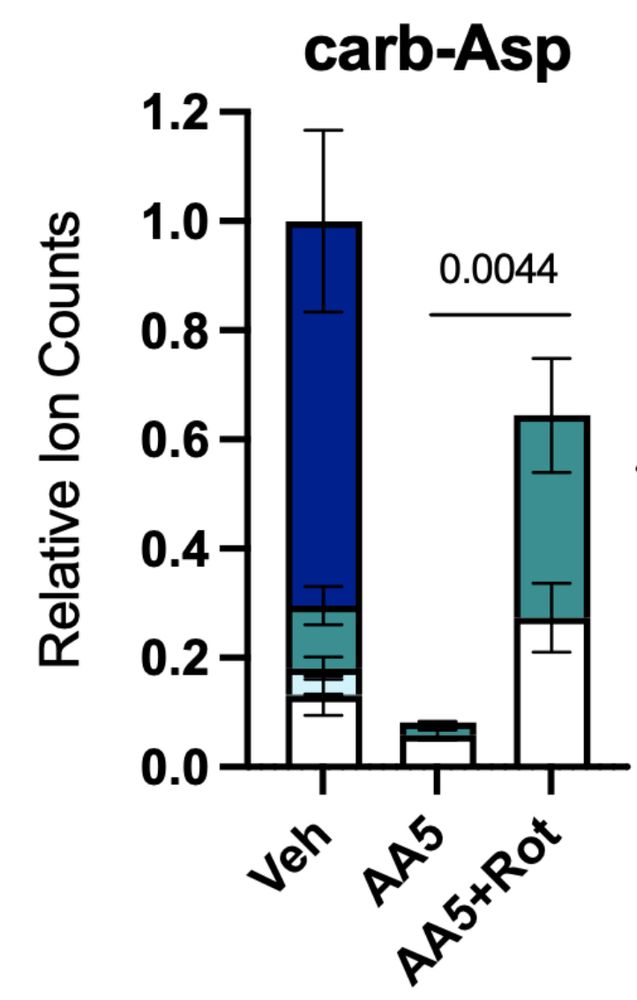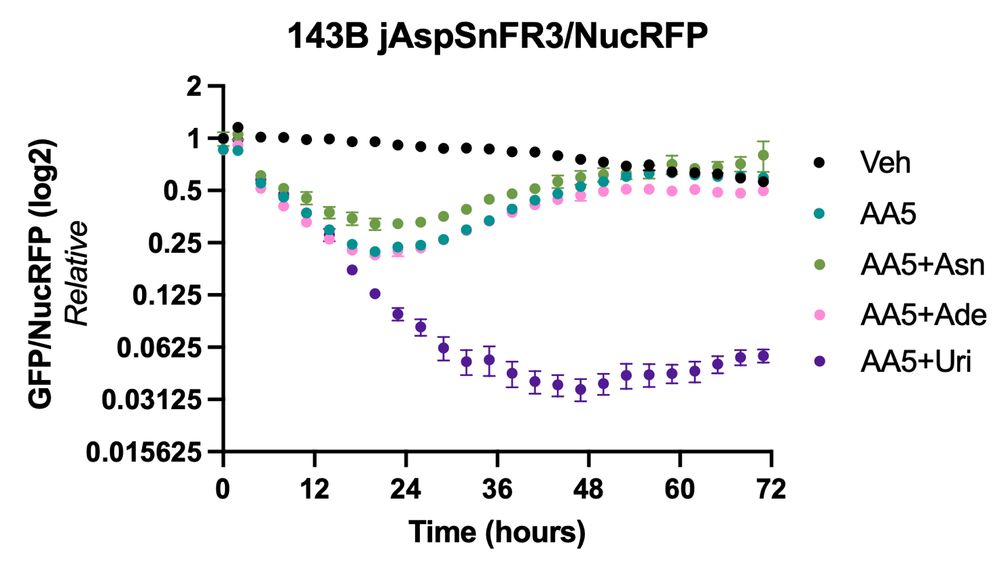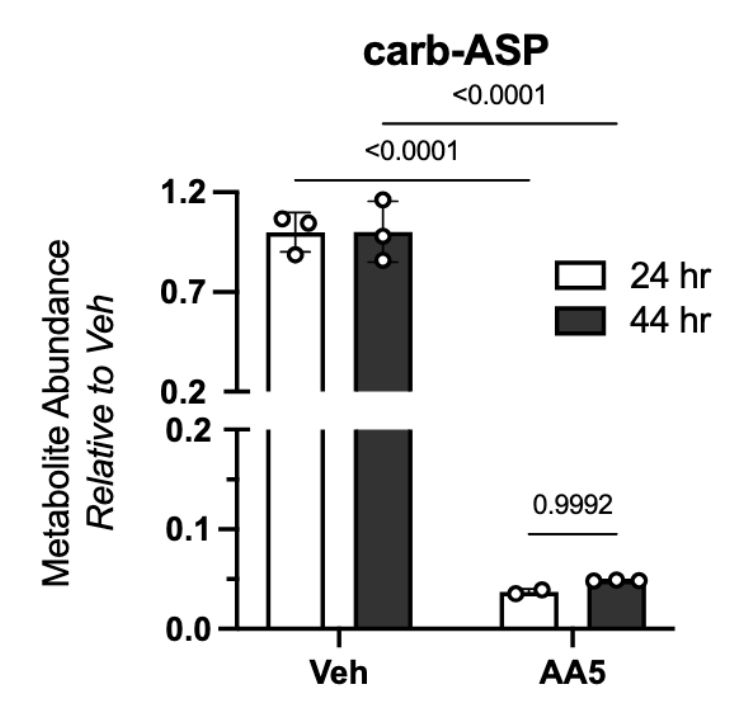
Lucas Sullivan
@lucasbsullivan.bsky.social
Associate Professor @ Fred Hutch
Studying metabolic constraints of cancer cell proliferation
https://research.fredhutch.org/sullivan/en.html
On a mote of dust suspended in a sunbeam
Studying metabolic constraints of cancer cell proliferation
https://research.fredhutch.org/sullivan/en.html
On a mote of dust suspended in a sunbeam
October 13, 2025 at 9:07 PM
One new reviewer-initiated experiment: Unlike cancer cells, non-transformed cells grow poorly in serum free conditions. Highlights the fact that cancer cells are defined, in part, by the lack of requirement for exogenous growth factors. Makes fetal serum use for cancer cells all the more absurd!

October 13, 2025 at 9:06 PM
One new reviewer-initiated experiment: Unlike cancer cells, non-transformed cells grow poorly in serum free conditions. Highlights the fact that cancer cells are defined, in part, by the lack of requirement for exogenous growth factors. Makes fetal serum use for cancer cells all the more absurd!
Hello, can you add me please?
March 30, 2025 at 10:31 PM
Hello, can you add me please?
Thanks Jakub!
February 22, 2025 at 10:58 PM
Thanks Jakub!
Thanks to Madeleine for wanting to stick around post-graduation to figure out “the boomerang” and the rest of the team for support, esp Kristian for quantitative efforts. Thanks to NIGMS and NCI for funding. Also, watch out for Madeleine's next act with @saranowinski.bsky.social!
February 20, 2025 at 10:25 PM
Thanks to Madeleine for wanting to stick around post-graduation to figure out “the boomerang” and the rest of the team for support, esp Kristian for quantitative efforts. Thanks to NIGMS and NCI for funding. Also, watch out for Madeleine's next act with @saranowinski.bsky.social!
TLDR – we find that, upon SDH loss, the combined effects of ASP depletion and succinate accumulation profoundly inhibit ATCase. Pyrimidine loss impairs ASP consumption for biosynthesis, causing ASP to accumulate until it outcompetes succinate to restart pyrimidines/biosynthesis once again.
February 20, 2025 at 10:25 PM
TLDR – we find that, upon SDH loss, the combined effects of ASP depletion and succinate accumulation profoundly inhibit ATCase. Pyrimidine loss impairs ASP consumption for biosynthesis, causing ASP to accumulate until it outcompetes succinate to restart pyrimidines/biosynthesis once again.
The full paper has plenty more (ASP flux measurements, succinate sufficiency, replication stress), so I invite you to give it a full read. There are also fun phenotypes that epitomize some of the logical pitfalls that we metabolism nerds often warn about (e.g. levels =/= flux).
February 20, 2025 at 10:25 PM
The full paper has plenty more (ASP flux measurements, succinate sufficiency, replication stress), so I invite you to give it a full read. There are also fun phenotypes that epitomize some of the logical pitfalls that we metabolism nerds often warn about (e.g. levels =/= flux).
We found SDH impaired cells can reach >10 mM!
Conclusion: succinate competes with diminished ASP at ATCase, blocking pyrimidine synthesis. To our knowledge the first description of this relationship in cells + revealing another potential regulatory function of succinate.
Conclusion: succinate competes with diminished ASP at ATCase, blocking pyrimidine synthesis. To our knowledge the first description of this relationship in cells + revealing another potential regulatory function of succinate.
February 20, 2025 at 10:25 PM
We found SDH impaired cells can reach >10 mM!
Conclusion: succinate competes with diminished ASP at ATCase, blocking pyrimidine synthesis. To our knowledge the first description of this relationship in cells + revealing another potential regulatory function of succinate.
Conclusion: succinate competes with diminished ASP at ATCase, blocking pyrimidine synthesis. To our knowledge the first description of this relationship in cells + revealing another potential regulatory function of succinate.
A literature search found a goldmine: E Coli ATCase was a workhorse of biochemistry for decades (e.g. ⬇️) One compound used to impair its function in vitro? Succinate! While the concentrations needed to impair ATCase in vitro seemed unrealistic at ~1+ mM...
pubmed.ncbi.nlm.nih.gov/3894357/
pubmed.ncbi.nlm.nih.gov/3894357/

Substrate specificity of aspartate transcarbamylase. Interaction of the enzyme with analogs of aspartate and succinate - PubMed
The ability of aspartate transcarbamylase from Escherichia coli to catalyze carbamylation of amino acids other than the natural substrate, L-aspartate, was examined. Cysteine, cysteate, cysteinesulfin...
pubmed.ncbi.nlm.nih.gov
February 20, 2025 at 10:25 PM
A literature search found a goldmine: E Coli ATCase was a workhorse of biochemistry for decades (e.g. ⬇️) One compound used to impair its function in vitro? Succinate! While the concentrations needed to impair ATCase in vitro seemed unrealistic at ~1+ mM...
pubmed.ncbi.nlm.nih.gov/3894357/
pubmed.ncbi.nlm.nih.gov/3894357/
SDH inhibition is distinct from other mitochondrial impairments due to the accumulation of succinate, which we hypothesized to play a role. First, we decreased succinate production by cotreating with the CI inhibitor rotenone. Result: restoration of pyrimidine synthesis, even with comparable ASP.

February 20, 2025 at 10:25 PM
SDH inhibition is distinct from other mitochondrial impairments due to the accumulation of succinate, which we hypothesized to play a role. First, we decreased succinate production by cotreating with the CI inhibitor rotenone. Result: restoration of pyrimidine synthesis, even with comparable ASP.
So, what happens if we restore pyrimidines to these cells?
A complete loss of the ASP rebound and a return to the (very reasonable) phenotype of monotonic ASP depletion.
So, SDH loss causes a disproportionate effect on pyrimidine synthesis by impairing ATCase, but why?
A complete loss of the ASP rebound and a return to the (very reasonable) phenotype of monotonic ASP depletion.
So, SDH loss causes a disproportionate effect on pyrimidine synthesis by impairing ATCase, but why?

February 20, 2025 at 10:25 PM
So, what happens if we restore pyrimidines to these cells?
A complete loss of the ASP rebound and a return to the (very reasonable) phenotype of monotonic ASP depletion.
So, SDH loss causes a disproportionate effect on pyrimidine synthesis by impairing ATCase, but why?
A complete loss of the ASP rebound and a return to the (very reasonable) phenotype of monotonic ASP depletion.
So, SDH loss causes a disproportionate effect on pyrimidine synthesis by impairing ATCase, but why?
We next investigated the biosynthetic fates of aspartate and found:
Aspartyl tRNA charge = OK
Purine nucleotides = OK
ASN = OK - Rebounds with ASP
Pyrimidine nucleotides = Depleted at the first step (ATCase, which makes Carb-ASP) - and stays depleted even with rebounding ASP:
Aspartyl tRNA charge = OK
Purine nucleotides = OK
ASN = OK - Rebounds with ASP
Pyrimidine nucleotides = Depleted at the first step (ATCase, which makes Carb-ASP) - and stays depleted even with rebounding ASP:

February 20, 2025 at 10:25 PM
We next investigated the biosynthetic fates of aspartate and found:
Aspartyl tRNA charge = OK
Purine nucleotides = OK
ASN = OK - Rebounds with ASP
Pyrimidine nucleotides = Depleted at the first step (ATCase, which makes Carb-ASP) - and stays depleted even with rebounding ASP:
Aspartyl tRNA charge = OK
Purine nucleotides = OK
ASN = OK - Rebounds with ASP
Pyrimidine nucleotides = Depleted at the first step (ATCase, which makes Carb-ASP) - and stays depleted even with rebounding ASP:

